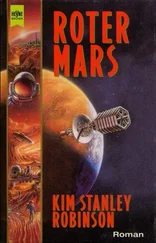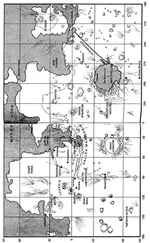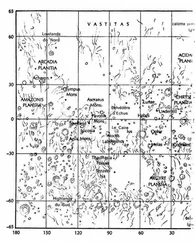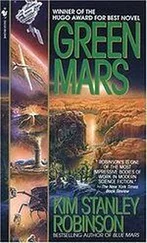There were two of these boulder cars, it turned out; big rovers, shelled by a thin layer of actual basalt. “What about their thermal signals?” Sax asked as he ducked into one.
“We direct all the heat into coils, and bury the coils. So there’s no signal to speak of.”
“Good idea.”
The young driver helped them into the new cars. “Let’s get out of here,” he said brusquely, almost shoving them through the outer lock doors. Light from the lock illuminated his face, framed by his helmet: Asian, perhaps twenty-five, he aided the refugees without meeting their eye, appearing disgruntled, disgusted, perhaps frightened. He said to them scornfully, “Next time you have a revolution you’d better try some other way.
When the occupants of the elevator car Bangkok Friend learned that Clarke had broken away and the cable was falling, they hurried to the foyer and the locker room and pulled on emergency spacesuits as fast as they could, and for a wonder there was no general panic, it all happened in the heart, on the surface everyone was businesslike and attentive to the small group at the lock door who were trying to determine where exactly they were, and when they should abandon the car. This steadiness amazed Peter Clayborne, whose own blood was hammering through his body in great adrenal shocks; he wasn’t sure he could have spoken if he had to. A man in the group at the front told them in level tones that they were approaching the areosynchronous point and so they all pulled into the lock together until they were jammed in like the suits had been in the storage closet, and then they locked the lock and sucked the air. The outer door slid open and there it was, a big rectangle of starry death-black space. It was daunting indeed to launch into it in an untethered spacesuit, it felt to the young man like suicide; but the ones at the front pulled out and the rest followed, like spores from an exploding seed pod.
The car and the elevator dwindled eastward and quickly disappeared. The cloud of spacesuits began to disperse. Many of them stabilized with their feet toward Mars, which lay below them like a dirty basketball. When steady, they ignited their main rockets and lofted upward. The group doing the calculations was still on the common band, talking it over as if it were a chess problem. They were near the areosynchronous orbit, but with a downward velocity of several hundred kilometers an hour; burning half their main packs’ fuel would counteract most of that, and then they would be in an orbit much more stable than would be strictly necessary, given their air supplies. In other words they would die later of asphyxiation rather than sooner of reentry heat. But then that had been the whole point of bailing out in the first place. It was possible rescuers might appear in the grace period, one never knew. Clearly most people were willing to give it a try.
The young man pulled his rocket-control rods out of his wrist consoles and put his fingers and thumbs on the buttons and got the world between his boots, and shot away from it for a while. Some of the others were trying to stay together, but he judged it impossible and a waste of fuel, and let them drift off above him until they were just more stars. He wasn’t as frightened as he had been in the locker, but he was angry and sad: he didn’t want to die. A spasm of grief for his lost future shook through him and he cried aloud, and wept. After a while the physical manifestations went away, even though he felt just as miserable as before. He stared dully at the stars. Occasional gusts of fright or despair shuddered through him, but they became less frequent as the minutes dragged on and then the hours. He tried to slow his metabolism but the effort had the opposite effect to that intended, and he decided to forget about it, although first he did call up his pulse rate on his wrist console: 108 beats a minute. Lucky he hadn’t checked when they were suiting up and bailing out. He grimaced and tried identifying constellations. Time dragged by.
He woke up, and when he realized he had fallen asleep he was both appalled and amused, and promptly fell back asleep. Then after a time he was awake again, this time for good. The other refugees from the car were out of sight, though some stars seemed to move against the backdrop, and could have been them. No sign of the elevator, in space or down on the planet’s surface.
It was an odd way to go. Something like the night before a date with the firing squad, perhaps, spent in a dream of space. Death would be like space, except without the stars or the thinking. It was a tedious wait in some ways; it made him impatient, and he considered turning off his heating system and having done with it. Knowing he could do that made the wait easier, and he figured he would do it when the air supply was about to run out. The thought put his pulse up to 130, and he tried to concentrate on the planet below. Home sweet home. He was still in almost areosynchronous orbit, it had been hours and Tharsis was still below, though a bit farther west. He was over Marineris.
Hours passed and without intending to, he fell asleep again. When he woke there was a small silver spacecraft hanging before him like a UFO and he shouted with surprise, and started tumbling helplessly. He worked the rockets feverishly to bring himself under control, and when he managed it the craft was still there. There was a woman’s face in a side-window port, talking to him and pointing to her ear. He turned on the common band but she wasn’t on it; he couldn’t find her. He rocketed over toward the craft and scared the woman by nearly crashing into it. He managed to arrest and draw back a bit. The woman was gesturing; did he want in? He made a clumsy circle with gloved forefinger and thumb, nodding so vigorously that he started tumbling again. As he spun he saw a bay door open behind the window, on top of the craft. He got the suit stabilized and puffed toward the bay, wondering if it would be real when he got to it. He touched the open doorway and tears sprang to his eyes; he blinked and the teardrop spheres floated into his faceplate as he flattened against the bottom of the bay. He had an hour of air left.
When the bay was closed and pumped he unsealed his helmet and lifted it off. The air was thin and oxygen-rich, and cool. The bay lock door opened and he pushed through.
Women were laughing. There were two of them aboard, and they were in high spirits. “What were you going to do, land in that?” one asked.
“I was on the elevator,” he said, voice cracking. “We had to jump off. Have you picked up anyone else?”
“You’re the only one we’ve seen. Want a ride down?”
He could only gulp. They laughed at him.
“We’re amazed to run into anyone out here, boy! How many gs are you comfortable with?”
“I don’t know— three?”
They laughed again.
“Why, how many can you take?”
“A lot more than that,” said the woman who had looked out at him.
“A lot more,” he scoffed. “How many more can a person take?”
“We’ll find out,” the other woman said, and laughed. The little craft began to accelerate down toward Mars. The youth lay exhausted in a g chair behind the two women, asking questions and sucking down water and cheddar cheese from a tube. They had been on one of the mirror complexes and had hijacked this emergency descender after sending the mirrors tumbling in a tangle of molecule-thin sheets. They were complicating their descent by shifting into a polar orbit; they were going to land near the south polar cap.
Peter absorbed this in silence. Then they were bouncing wildly and the windows went white, then yellow, then a deep angry orange. Gravity forces jammed him back in his chair, his vision blurred and his neck hurt. “What a lightweight,” one of the women said, and he didn’t know if she meant him or the descender.
Читать дальше
Конец ознакомительного отрывка
Купить книгу












